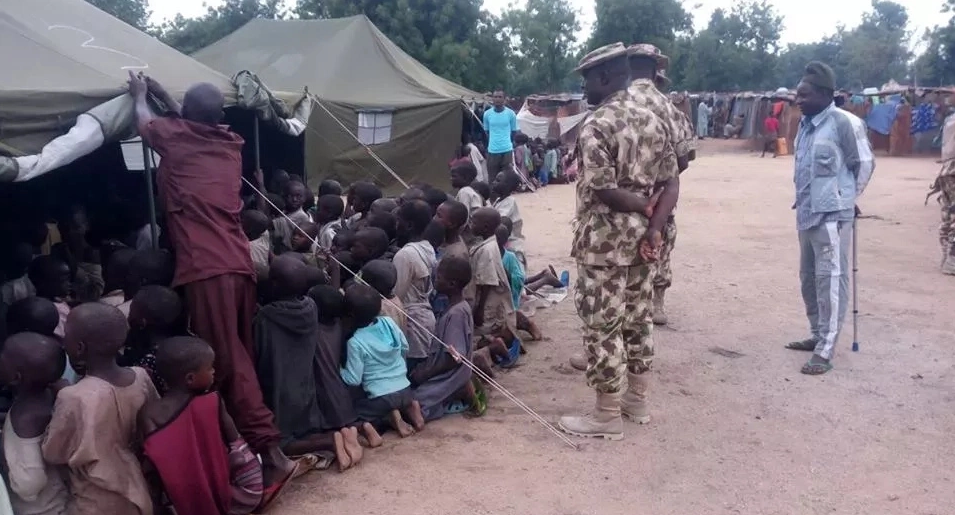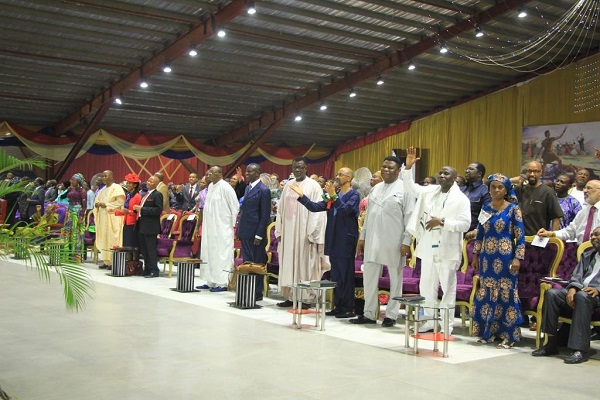Some security officials in the north-east have been accused of preying on the victims they have been assigned to protect.
Last year alone, countless cases of rape and sexual violence were reported in seven internally displaced persons (IDP) camps in Borno state.
According to a report by New York Times, one Falmata, who was reportedly abducted from her home and raped repeatedly by Boko Haram fighters for three years, recently had a raw deal in the hands of some soldiers at a camp in Dalori, Borno state.
She was said to have escaped after slipping into the bush while her captors slept.
Advertisement
Fourteen years old and alone, she made it to the camp and had just settled in for the night when she heard footsteps outside her tent.
A security officer’s voice reportedly instructed her to come out and she obeyed.
He was said to have taken her to his quarters, where she was allegedly raped. Hours later, after she had returned to her tent, another officer was also said to have arrived.
Advertisement
“The same day I was brought there, soldiers started coming to rape me,” Falmata was quoted to have said.
“They did it one after another. I’m not even sure those two knew about each other.”
Another 13-year-old reportedly narrated her sour experience in the hands of security operatives.
“The soldiers would come and hold me so tight,” said the girl who had been reportedly raped at least 10 times this year at a camp in Maiduguri, Borno capital.
Advertisement
Some residents of a camp known as Teachers Village said security forces had worked out a system to select their rape victims.
“Young women were called to cook for them,” the newspaper said in its report.
“After the women finished, security officers insisted that they clean up, telling them to go bathe in the officers’ quarters as the men watched.”
An 18-year-old girl simply identified as Hadiza, spoke of her experience in the hands of those “old enough to be my parents”.
Advertisement
“At first none of us knew they were doing this,” Hadiza reportedly said.
“But then the stories started to spread around camp that anyone cooking for them would be raped.”
Advertisement
After living in the camp for several weeks, Hadiza said she was picked to cook for the officers.
“Definitely my time has come,” she recalled.
Advertisement
Later, she was asked to serve water to four security officers in their room as they dined. One by one they left, she said, until only one man remained. He allegedly dragged her into a separate room and raped her.
Hadiza was injured, she said, but did not ask for medical care, fearing that the officers would seek revenge.
Advertisement
She said she tried to keep a low profile for a couple of weeks, but officers spotted her and raped her again. She said she had been raped as many as 20 times in the camp.
“Once they identified you as a girl they wanted to have sex with, they would hardly leave you alone a single day,” Hadiza said.
Last year, President Muhammadu Buhari called for an investigation into sexual assaults at the camps after Human Rights Watch detailed the abuse in a report, ordering new measures to protect the vulnerable.
The police later arrested several men for sexually abusing and exploiting women and girls. Those arrested included two police officers, a prison warden, two members of the civilian joint task force, a civil servant and three soldiers.
In June, an army special board of inquiry said allegations against soldiers at the camps were unfounded.
Mausi Segun, executive director of the Africa division of Human Rights Watch, said much success has not been recorded due to delay in executing Buhari’s mandate.
“Very little progress has been made by Nigerian authorities to implement President Buhari’s promise of justice for the survivors,” he told New York Times.
“The delay reinforces displaced people’s sense of helplessness, and likely emboldens more perpetrators to prey on their vulnerability.”
As of the time this report was filed, TheCable could not reach Sani Usman, spokesman of the Nigerian army, as he neither answered his call nor replied a text message.
Add a comment






